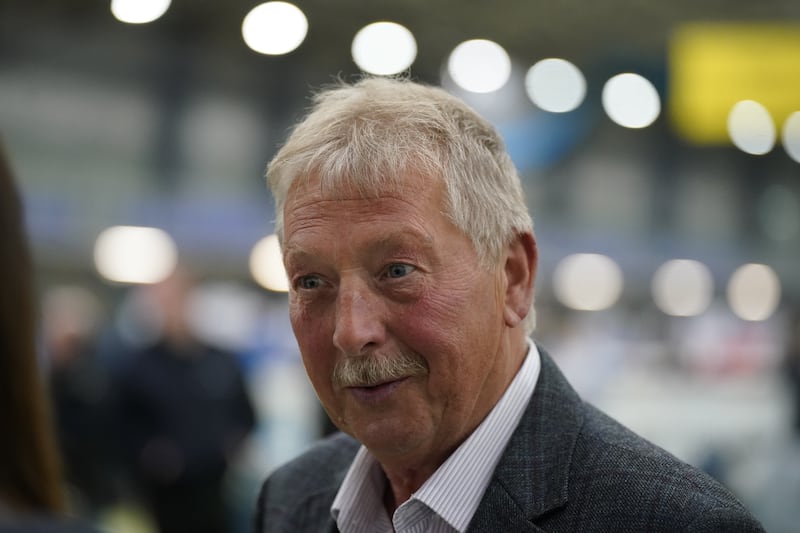Martin McGuinness was not happy. It was 40 years ago, and he was standing in a family kitchen which had been wrecked during a British Army raid on Rossville flats, close to the centre of his native Derry.
Some unionists claimed that the multi-storey complex was effectively an IRA base during a period of enormous upheaval in the city, and demanded firm action from the forces of the state.
The residents had a very different view, and insisted that they were the victims of blatant harassment while being forced to live in sub-standard Housing Executive accommodation.
- The journey of Martin McGuinnessOpens in new window
- Role of the late Martin McGuinness within republicanism highlighted in previously confidential filesOpens in new window
- Denis Bradley: McGuinness legacy will always be a mixed oneOpens in new window
- Claims by Martin McGuinness that he left IRA in 1974 rejected in new RTÉ documentaryOpens in new window
Wherever the truth lay, nothing was found during an intervention involving scores of heavily armed soldiers which left furniture smashed, floorboards lifted and fittings pulled from walls.
McGuinness arrived as the military left, and was immediately surrounded by people who wanted to know, with varying degrees of directness, what his response was going to be.
The priority for some was persuading housing officials to organise a full repair operation, while others left him in no doubt that, regardless of the consequences, they believed a much blunter republican message should follow.
It was a discussion with which even at that stage McGuinness appeared to be well versed, and he was capable of using language which satisfied both sides.
As a fairly young reporter, new to Derry, I introduced myself to the man who was known to be the IRA commander in the city, with direct responsibility for many horrendous events.
He was guarded in his specific comments, which was not surprising as he was dealing with an unfamiliar face, but a connection had at least been made.
We met often over the next few years in the mid-1980s, sometimes close to street confrontations but also increasingly in the context of his growing political commitments.
After only a short delay, the first floor bedroom window opened and a familiar tousled head slowly appeared. Martin McGuinness fortunately recognised me, brought me into his kitchen and made tea and toast, which we shared as he offered a coherent but very pointed account of his experiences in Castlereagh
One notable encounter came after McGuinness, together with several other top republicans, was arrested when alleged associates decided to cooperate with the authorities and provided what was referred to as supergrass evidence.
A febrile atmosphere developed, with intense speculation that practically the entire republican leadership was going to be accused of serious offences which could result in jail sentences stretching into decades.
McGuinness was eventually released from Castlereagh holding centre without charge in the early hours, although others remained in custody, and the newsdesk at The Belfast Telegraph, where I worked at the time, felt it was essential to speak to him without delay.

Neither he nor any other of his prominent colleagues were answering their phones so a decision was taken that I would have to doorstep him – that is, call to his family house which was then in the Brandywell area of Derry city.
It was unusual then and now for senior politicians to be approached at their homes by journalists without any form of notice, and, particularly in republican circles, it was always difficult to say how a visitor would be received.
The Telegraph’s newsdesk instructed me to go ahead with the engagement but proceed cautiously, so it was with a fair amount of trepidation that I walked alone through the narrow pathways of the staunchly nationalist estate, where a strikingly high number of barking dogs acknowledged my presence at around 8am on a cold Saturday morning.
- Alex Kane: I wanted to know if McGuinness had those ‘waking in the night, bathed in the sweat of remorse’ momentsOpens in new window
- Martin McGuinness travelled to London 'in disguise' at height of IRA notorietyOpens in new window
- 'My friendship with McGuinness started with a paint bomb attack'Opens in new window
- Martin McGuinness - A life in picturesOpens in new window
I knocked at the front door of the modest McGuinness residence, which was almost at the back wall of Derry City FC’s stadium, and would not have been unduly disappointed if there had been no reply and I was able to return swiftly to the comforts of my office.
However, after only a short delay, the first floor bedroom window opened and a familiar tousled head slowly appeared.
McGuinness fortunately recognised me, brought me into his kitchen and made tea and toast, which we shared as he offered a coherent but very pointed account of his experiences in Castlereagh.
We parted on amicable terms and I was able to file a report which was part of the detailed wider coverage on the front page of that evening’s Telegraph.
McGuinness and I later talked regularly, occasionally in relatively more salubrious circumstances when he was the Sinn Féin deputy first minister and I was editor of The Irish News, and we sometimes joked about how times had changed.

There have been some recent attempts to suggest that McGuinness, who died in 2017 and would have been 74 last week, was somehow protected by the authorities during the height of his IRA activities.
His life was undoubtedly surrounded by complexities, although perhaps the most reliable verdict comes from Denis Bradley, author of the masterful book Peace Comes Dropping Slow, published earlier this year, who knew McGuinness better than most, and rejects the rumours.
All I can say with certainty is that McGuinness was among the most central movers in a political process which transformed our society for the better. On one chilly Derry morning, he also made a fine cup of tea.










